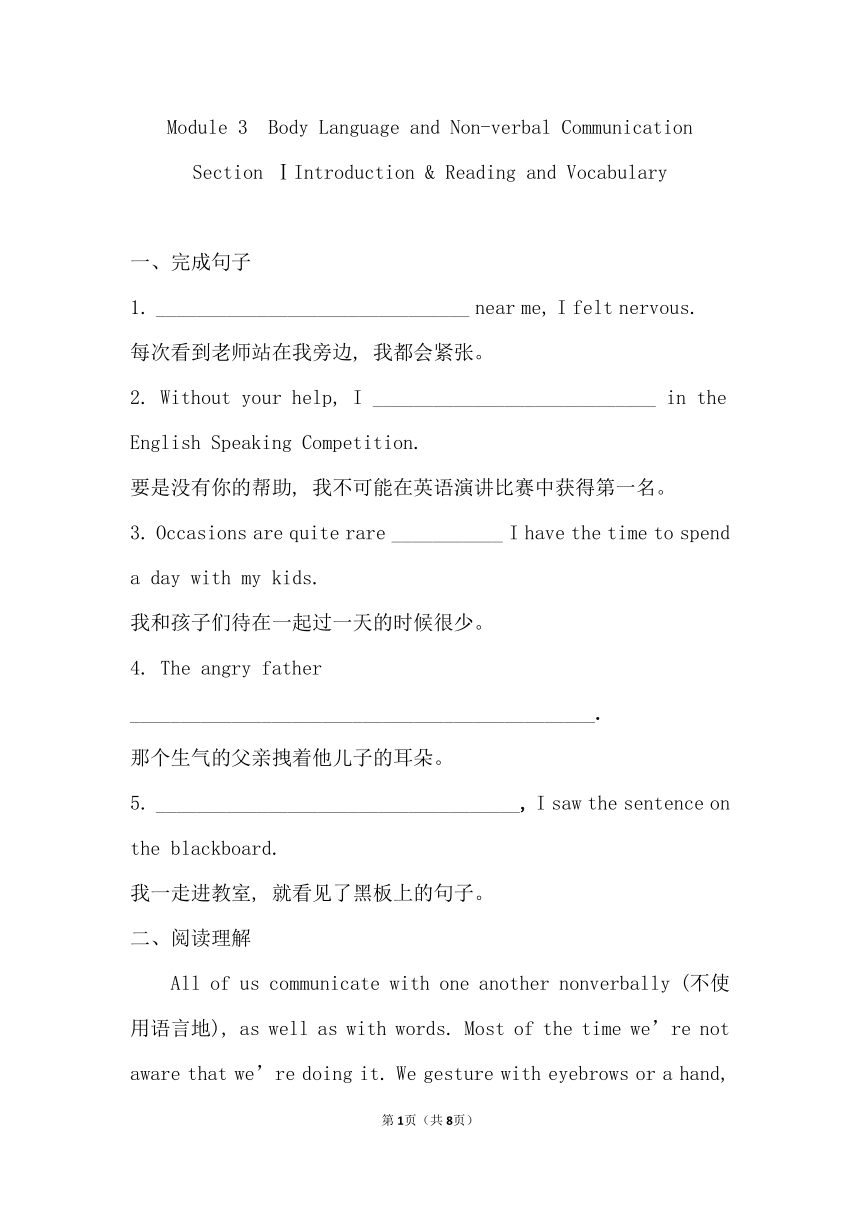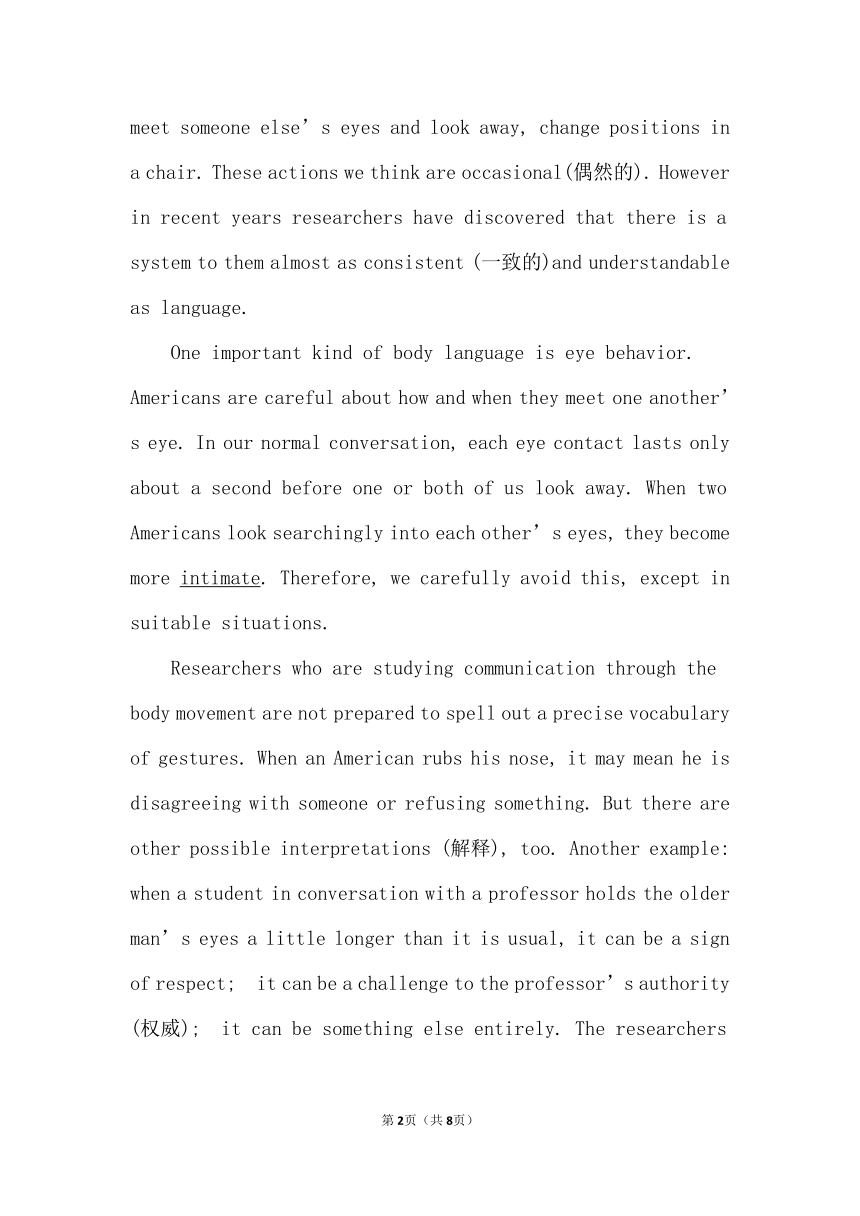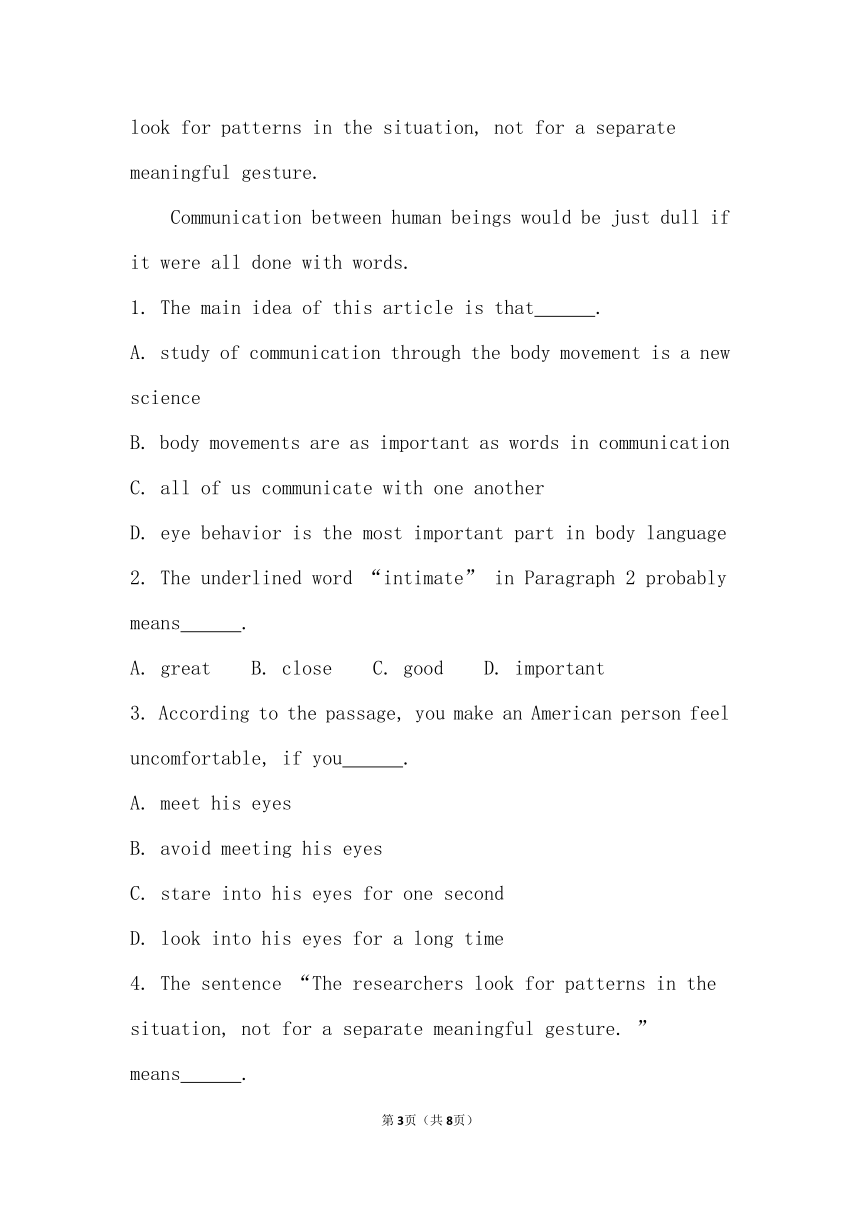外研版必修四:Module 3 Body Language Introduction & Reading and Vocabulary 课后强化提升练-(含答案)
文档属性
| 名称 | 外研版必修四:Module 3 Body Language Introduction & Reading and Vocabulary 课后强化提升练-(含答案) |

|
|
| 格式 | doc | ||
| 文件大小 | 36.5KB | ||
| 资源类型 | 教案 | ||
| 版本资源 | 外研版 | ||
| 科目 | 英语 | ||
| 更新时间 | 2021-12-08 00:00:00 | ||
图片预览




文档简介
Module 3 Body Language and Non-verbal Communication
Section ⅠIntroduction & Reading and Vocabulary
一、完成句子
1. _______________________________ near me, I felt nervous.
每次看到老师站在我旁边, 我都会紧张。
2. Without your help, I ____________________________ in the English Speaking Competition.
要是没有你的帮助, 我不可能在英语演讲比赛中获得第一名。
3. Occasions are quite rare ___________ I have the time to spend a day with my kids.
我和孩子们待在一起过一天的时候很少。
4. The angry father ______________________________________________.
那个生气的父亲拽着他儿子的耳朵。
5. ____________________________________, I saw the sentence on the blackboard.
我一走进教室, 就看见了黑板上的句子。
二、阅读理解
All of us communicate with one another nonverbally (不使用语言地), as well as with words. Most of the time we’re not aware that we’re doing it. We gesture with eyebrows or a hand, meet someone else’s eyes and look away, change positions in a chair. These actions we think are occasional(偶然的). However in recent years researchers have discovered that there is a system to them almost as consistent (一致的)and understandable as language.
One important kind of body language is eye behavior. Americans are careful about how and when they meet one another’s eye. In our normal conversation, each eye contact lasts only about a second before one or both of us look away. When two Americans look searchingly into each other’s eyes, they become more intimate. Therefore, we carefully avoid this, except in suitable situations.
Researchers who are studying communication through the body movement are not prepared to spell out a precise vocabulary of gestures. When an American rubs his nose, it may mean he is disagreeing with someone or refusing something. But there are other possible interpretations (解释), too. Another example: when a student in conversation with a professor holds the older man’s eyes a little longer than it is usual, it can be a sign of respect; it can be a challenge to the professor’s authority (权威); it can be something else entirely. The researchers look for patterns in the situation, not for a separate meaningful gesture.
Communication between human beings would be just dull if it were all done with words.
1. The main idea of this article is that .
A. study of communication through the body movement is a new science
B. body movements are as important as words in communication
C. all of us communicate with one another
D. eye behavior is the most important part in body language
2. The underlined word “intimate” in Paragraph 2 probably means .
A. great B. close C. good D. important
3. According to the passage, you make an American person feel uncomfortable, if you .
A. meet his eyes
B. avoid meeting his eyes
C. stare into his eyes for one second
D. look into his eyes for a long time
4. The sentence “The researchers look for patterns in the situation, not for a separate meaningful gesture. ” means .
A. the researchers explain the meaning of a gesture according to the situation in which it is used
B. the researchers believe that one gesture has only one meaning
C. the researchers think that one gesture can not be used in different situations
D. the researchers look for patterns in textbooks to explain the meaning of a gesture
三、短文改错
假定英语课上老师要求同桌之间交换修改作文, 请你修改你同桌写的以下作文。文中共有10处语言错误, 每句中最多有两处。每处错误仅涉及一个单词的增加、删除或修改。
One day when I was eight years old, I visit the village where my grandmother lived. While I was walked around in the village, I saw an orange on an orange tree. It was the only leaving on the tree. I immediate wanted to get it. Therefore, I wasn’t the only one who saw it. Another boy desired to get it, too. So when he tried to get it, the boy stopped me from reach it. When the boy tried to get it, I did same thing to him. So in the end, neither of us got it. What stupid we were back then! Why didn’t we just share of it
一、完成句子
1.Every time I saw the teacher standing
2.couldn’t have won the first place
3.on which
4.pulled his son by the ear
5.The moment I came into the classroom
二、阅读理解
1.B。根据全文内容尤其是第一段的首句和最后一段可知, 我们平时使用语言交流, 也进行非语言的交流, 如果人们全部用语言交流, 那将是很无聊的。
2.B。一般眼睛接触不超过一秒钟, 如果双方都想从对方的眼睛里找到什么, 这种眼睛交流要在特定的场合下使用, 因此推出他们的关系很亲密(close)。
3.D。根据第二段的“In our normal conversation, each eye contact lasts only about a second before one or both of us look away. ” 可知B项错误; A项, C项属于正常的; 超过一秒的目光接触是不正常的, 会使他不安。
4.A。根据倒数第二段的例子: 一个人盯着长辈的眼睛看有几种解释, 每种解释都要依据当时的情景来判断。因此该句的意思是: 研究人员对于肢体语言的解释要依据它所使用的语境。
三、短文改错
1. 第一句visit→visited。考查时态。句意: 我八岁时的一天, 我去了祖母居住的村庄。根据本句的时间状语“One day when I was eight years old”可知是描述过去发生的事情, 应使用一般过去时。故将visit改为visited。
2. 第二句walked→walking。考查时态和语态。句意: 当我在村庄周围散步时, 我看到有个橘子在橘子树上。while引导时间状语从句时, 从句常使用进行时, 表示某个动作正在进行时, 又发生了另一动作, 文章是讲述过去发生的事, 所以while引导的时间状语从句使用过去进行时, 故将walked改为walking。
3. 第三句leaving→left。考查非谓语动词。句意: 它是唯一一个被留在树上的。the only指代前文中的“an orange”, 动词leave与the only之间是动宾关系, 应用过去分词作后置定语, 故将leaving改为left。
4. 第四句immediate→immediately。考查副词。句意: 我立刻就想得到它。修饰动词wanted应使用副词形式, 故将immediate 改为immediately。
5. 第五句Therefore→However。考查副词。句意: 然而, 我不是唯一看见它的人。上文提到“我想得到它”与本句“我不是唯一看见它的人”之间是转折关系, 应使用表示转折的副词however。故将Therefore 改为However。
6. 第七句he→I。考查代词。句意: 当我尽力得到它的时候, 这个男孩阻止我拿到它。根据“the boy stopped me from reach it”可知, 此处指“我”尽力得到它时, 男孩阻止。故将he改为I。
7.第七句reach→reaching。考查非谓语动词。stop sb. from doing sth. 是固定搭配, 意为“阻止某人做某事”, 故将reach改为reaching。
8. 第八句在same前加the。考查冠词。句意: 当这个男孩尽力得到它时, 我对他做了同样的事。same常和the搭配使用, 构成习惯搭配。故在same前加the。
9. 第十句What →How。考查感叹句。句意: 那时候我们多么愚蠢啊! what和how都可引导感叹句, what常用句型是: what(+a/an)+形容词+名词+主语+谓语; how常用句型是: how+形容词/副词+主语+谓语。根据“stupid we were”可知此处应用how引导。故将What改为How。
10.第十一句去掉share后的of。考查动词用法。句意: 我们为什么不分享它呢 share是及物动词, 后可直接加宾语it, of多余, 故去掉share后的of。
第8页(共8页)
Section ⅠIntroduction & Reading and Vocabulary
一、完成句子
1. _______________________________ near me, I felt nervous.
每次看到老师站在我旁边, 我都会紧张。
2. Without your help, I ____________________________ in the English Speaking Competition.
要是没有你的帮助, 我不可能在英语演讲比赛中获得第一名。
3. Occasions are quite rare ___________ I have the time to spend a day with my kids.
我和孩子们待在一起过一天的时候很少。
4. The angry father ______________________________________________.
那个生气的父亲拽着他儿子的耳朵。
5. ____________________________________, I saw the sentence on the blackboard.
我一走进教室, 就看见了黑板上的句子。
二、阅读理解
All of us communicate with one another nonverbally (不使用语言地), as well as with words. Most of the time we’re not aware that we’re doing it. We gesture with eyebrows or a hand, meet someone else’s eyes and look away, change positions in a chair. These actions we think are occasional(偶然的). However in recent years researchers have discovered that there is a system to them almost as consistent (一致的)and understandable as language.
One important kind of body language is eye behavior. Americans are careful about how and when they meet one another’s eye. In our normal conversation, each eye contact lasts only about a second before one or both of us look away. When two Americans look searchingly into each other’s eyes, they become more intimate. Therefore, we carefully avoid this, except in suitable situations.
Researchers who are studying communication through the body movement are not prepared to spell out a precise vocabulary of gestures. When an American rubs his nose, it may mean he is disagreeing with someone or refusing something. But there are other possible interpretations (解释), too. Another example: when a student in conversation with a professor holds the older man’s eyes a little longer than it is usual, it can be a sign of respect; it can be a challenge to the professor’s authority (权威); it can be something else entirely. The researchers look for patterns in the situation, not for a separate meaningful gesture.
Communication between human beings would be just dull if it were all done with words.
1. The main idea of this article is that .
A. study of communication through the body movement is a new science
B. body movements are as important as words in communication
C. all of us communicate with one another
D. eye behavior is the most important part in body language
2. The underlined word “intimate” in Paragraph 2 probably means .
A. great B. close C. good D. important
3. According to the passage, you make an American person feel uncomfortable, if you .
A. meet his eyes
B. avoid meeting his eyes
C. stare into his eyes for one second
D. look into his eyes for a long time
4. The sentence “The researchers look for patterns in the situation, not for a separate meaningful gesture. ” means .
A. the researchers explain the meaning of a gesture according to the situation in which it is used
B. the researchers believe that one gesture has only one meaning
C. the researchers think that one gesture can not be used in different situations
D. the researchers look for patterns in textbooks to explain the meaning of a gesture
三、短文改错
假定英语课上老师要求同桌之间交换修改作文, 请你修改你同桌写的以下作文。文中共有10处语言错误, 每句中最多有两处。每处错误仅涉及一个单词的增加、删除或修改。
One day when I was eight years old, I visit the village where my grandmother lived. While I was walked around in the village, I saw an orange on an orange tree. It was the only leaving on the tree. I immediate wanted to get it. Therefore, I wasn’t the only one who saw it. Another boy desired to get it, too. So when he tried to get it, the boy stopped me from reach it. When the boy tried to get it, I did same thing to him. So in the end, neither of us got it. What stupid we were back then! Why didn’t we just share of it
一、完成句子
1.Every time I saw the teacher standing
2.couldn’t have won the first place
3.on which
4.pulled his son by the ear
5.The moment I came into the classroom
二、阅读理解
1.B。根据全文内容尤其是第一段的首句和最后一段可知, 我们平时使用语言交流, 也进行非语言的交流, 如果人们全部用语言交流, 那将是很无聊的。
2.B。一般眼睛接触不超过一秒钟, 如果双方都想从对方的眼睛里找到什么, 这种眼睛交流要在特定的场合下使用, 因此推出他们的关系很亲密(close)。
3.D。根据第二段的“In our normal conversation, each eye contact lasts only about a second before one or both of us look away. ” 可知B项错误; A项, C项属于正常的; 超过一秒的目光接触是不正常的, 会使他不安。
4.A。根据倒数第二段的例子: 一个人盯着长辈的眼睛看有几种解释, 每种解释都要依据当时的情景来判断。因此该句的意思是: 研究人员对于肢体语言的解释要依据它所使用的语境。
三、短文改错
1. 第一句visit→visited。考查时态。句意: 我八岁时的一天, 我去了祖母居住的村庄。根据本句的时间状语“One day when I was eight years old”可知是描述过去发生的事情, 应使用一般过去时。故将visit改为visited。
2. 第二句walked→walking。考查时态和语态。句意: 当我在村庄周围散步时, 我看到有个橘子在橘子树上。while引导时间状语从句时, 从句常使用进行时, 表示某个动作正在进行时, 又发生了另一动作, 文章是讲述过去发生的事, 所以while引导的时间状语从句使用过去进行时, 故将walked改为walking。
3. 第三句leaving→left。考查非谓语动词。句意: 它是唯一一个被留在树上的。the only指代前文中的“an orange”, 动词leave与the only之间是动宾关系, 应用过去分词作后置定语, 故将leaving改为left。
4. 第四句immediate→immediately。考查副词。句意: 我立刻就想得到它。修饰动词wanted应使用副词形式, 故将immediate 改为immediately。
5. 第五句Therefore→However。考查副词。句意: 然而, 我不是唯一看见它的人。上文提到“我想得到它”与本句“我不是唯一看见它的人”之间是转折关系, 应使用表示转折的副词however。故将Therefore 改为However。
6. 第七句he→I。考查代词。句意: 当我尽力得到它的时候, 这个男孩阻止我拿到它。根据“the boy stopped me from reach it”可知, 此处指“我”尽力得到它时, 男孩阻止。故将he改为I。
7.第七句reach→reaching。考查非谓语动词。stop sb. from doing sth. 是固定搭配, 意为“阻止某人做某事”, 故将reach改为reaching。
8. 第八句在same前加the。考查冠词。句意: 当这个男孩尽力得到它时, 我对他做了同样的事。same常和the搭配使用, 构成习惯搭配。故在same前加the。
9. 第十句What →How。考查感叹句。句意: 那时候我们多么愚蠢啊! what和how都可引导感叹句, what常用句型是: what(+a/an)+形容词+名词+主语+谓语; how常用句型是: how+形容词/副词+主语+谓语。根据“stupid we were”可知此处应用how引导。故将What改为How。
10.第十一句去掉share后的of。考查动词用法。句意: 我们为什么不分享它呢 share是及物动词, 后可直接加宾语it, of多余, 故去掉share后的of。
第8页(共8页)
